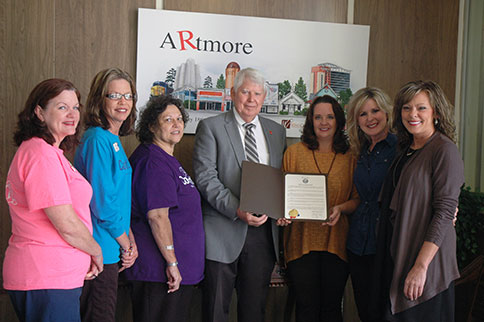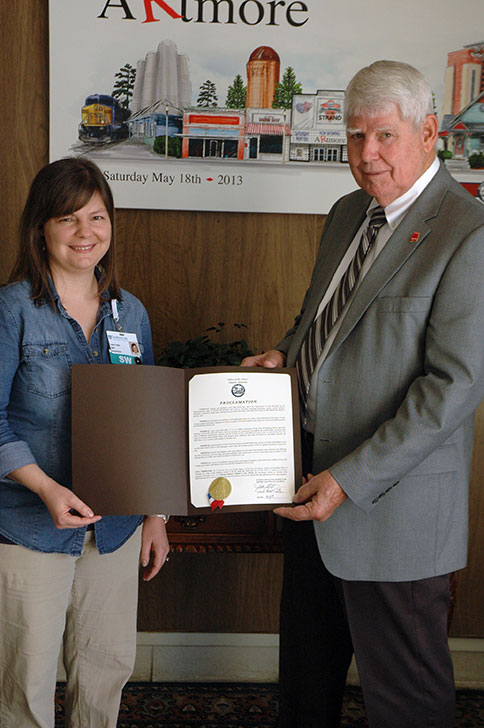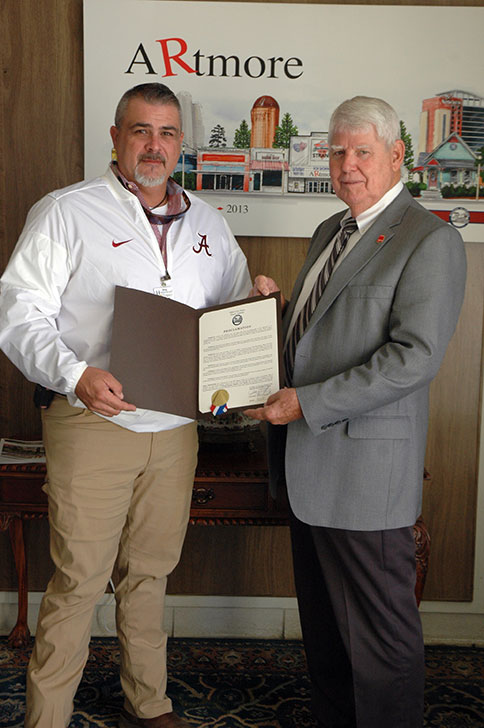
To most people, the thought of hospice care is a frightening one, an admission that they or a loved one are at life’s end. Even those in the hospice business admit that there is a stigma attached to the entrance of hospice into a patient’s medical care package.
But those same professionals also point out that such thoughts, while to some degree justifiable, are built upon misconception and fear.
“I want to encourage people to not be so afraid,” said Emmie Jernigan of ComfortCare Hospice, one of three area businesses honored last week with separate mayoral proclamations. “Of course, even we call it the ‘dirty word.’ But it has changed. I think people have in their minds that if their doctor tells them they need hospice care, they’re going to die the next day. But it’s not like that. Hospice is not designed to help you die; it’s designed to help you live.”
Jernigan knows first-hand how valuable the service can be, having lost her husband to cancer at age 43 and her father at age 58.
Leigh Ikner, director of operations for the Atmore office of SouthernCare Hospice Services, said several members of her extended family have benefited from such care. Ikner agreed that a person who has been through such an ordeal is better equipped to inform others of the misconceptions associated with hospice care, although the familiarity does little to ease the pain of losing a loved one.
“You’d think that would make it easier, but in some areas it makes it a little harder,” she said. “My grandmother fought cancer for 16 years; that’s one of the main reasons I went into hospice. For me, it’s about seeing transition people being comforted, seeing them not be scared. Comfort is the whole picture.”
She explained that hospice nurses and other employees try to make sure the patient understands his or her situation, but does not dwell negatively on it.
“You have to be prepared to meet people where they are,” Ikner said. “A lot of people with a terminal diagnosis are not going to get any better. We have to tell them some hard truths that they sometimes have never been told. We try to do that with love, laughter and medicine. Sometimes we cry with them.”
Considered the model for quality and compassionate care for people facing a life-limiting illness or injury, hospice care involves a team-oriented approach to quality medical care, pain management, and emotional and spiritual support that is expressly tailored to fit each patient’s needs and wishes.
In effect, to those with strong religious convictions, hospice professionals who share testimony or just listen to end-of-life confessions are helping pave the highway to Heaven.
“Hospice care is not specific, like hospital or home health care,” pointed out John C. Davis III, Community Relations Manager for Homestead Hospice. “We don’t just hold their hand until they die. We’re definitely going to hold their hand when they start that journey and hope we can provide a better quality of life during that journey. We want to see what’s around them and appreciate it and embrace it. That way, when they get to the end of the journey, they’re not constantly worrying themselves about what they might have left undone.”
Atmore Mayor Jim Staff praised the work of hospice professionals while issuing the proclamations designating his and the city’s support during November, which is recognized as National Hospice and Palliative Care Month.
“I appreciate what ya’ll do,” said Staff, who pointed out that his first experience with hospice was when his friend, Billy Duffield, was in the final stages of his life.
“I didn’t even know what hospice was until then. I had been told that it was a last resort. But they prayed with him and did a lot of good stuff. It really helped him, and I just want to thank all of you for doing such a great job.”
ComfortCare’s Maggie Quimby, who also became acquainted with hospice during the illness of her husband (who was not at end of life), vowed that she and others in the field would continue to help educate the public and remove the stigma that is still somewhat attached to hospice care. She pointed out that nobody knows just how long any given person has to live, no matter what their illness.
“A lot of people have that misconception that if you go on hospice, you’re definitely near the end,” she said. “Sometimes you are, but a lot of people come onto hospice and they live a few months, and some come onto hospice who are told they only have a few months, but they live a year or more.
“We don’t know how long any of them have. We are dedicated to making life easier for them, no matter how long they have. Only God knows the end result.”


